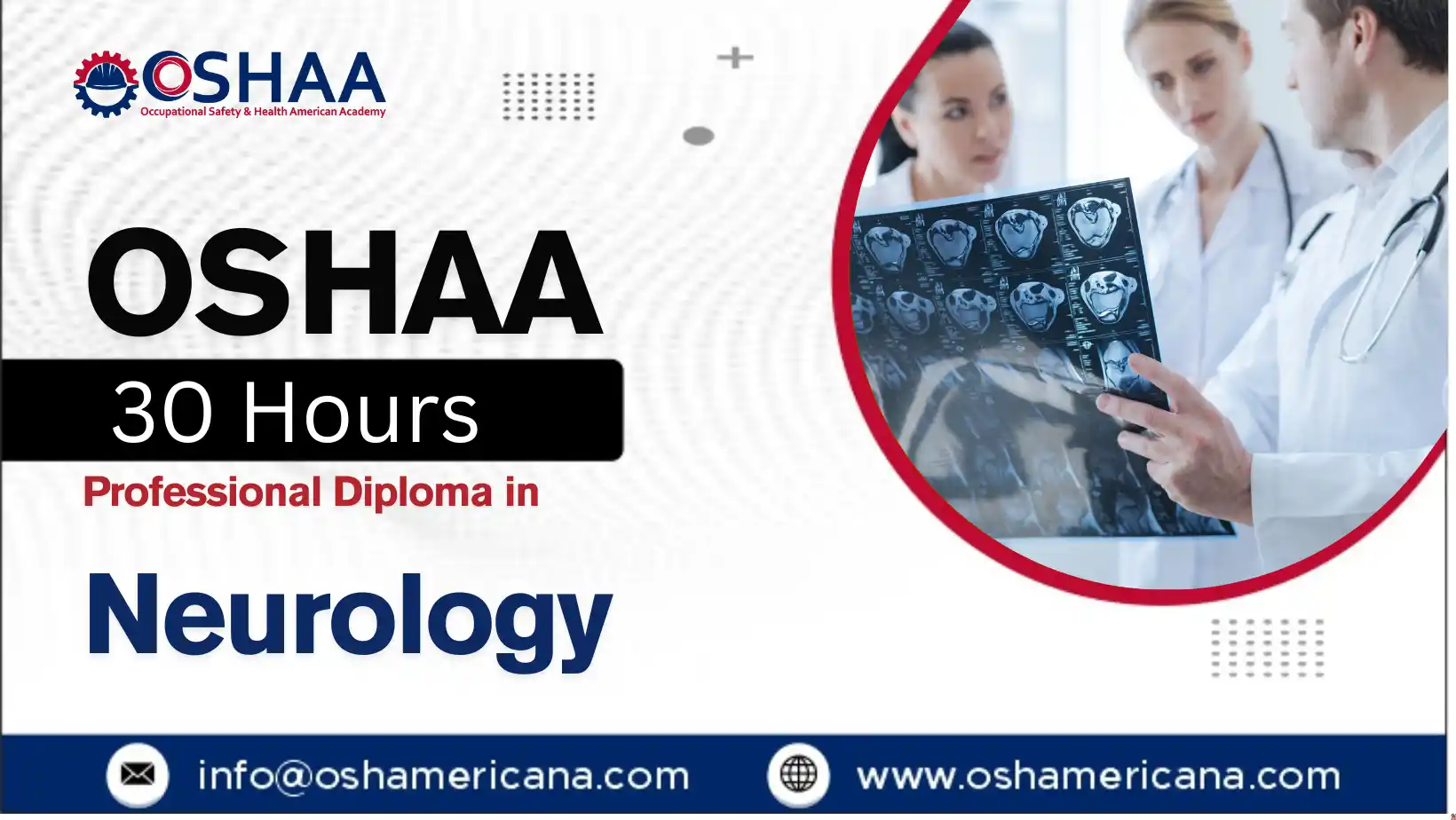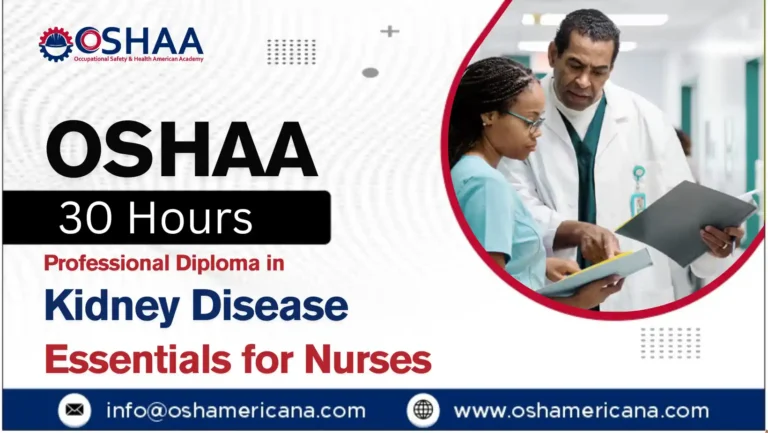Professional Diploma in Neurology – Master the Science of the Brain
Neurology is a cornerstone of modern medicine, providing insights into the structure, function, and disorders of the nervous system. The OSHAA 30-Hours Professional Diploma in Neurology offers a structured introduction to this complex and essential field, enabling participants to gain foundational knowledge of neurological anatomy, function, pathology, and clinical approaches. Designed to meet UK professional standards, this course supports participants in developing the confidence and competence to understand neurological health and disease across various healthcare and scientific settings.
The nervous system governs nearly every function of the human body, from thought and emotion to movement and sensory processing. Neurology as a discipline involves the study of the brain, spinal cord, peripheral nerves, and muscles. Understanding neurological systems is vital for identifying, managing, and supporting those affected by conditions such as epilepsy, stroke, multiple sclerosis, Parkinson’s disease, and more.
This diploma is specifically structured for participants seeking to build a solid conceptual framework of neurology without requiring a medical degree. It equips individuals with the knowledge and language necessary to interpret neurological symptoms, recognise red flags, and appreciate the diagnostic and therapeutic approaches used in clinical neurology.
Delivered over 30 guided learning hours, this diploma integrates theory with applied knowledge, offering an accessible yet detailed overview of the nervous system’s components and the major disorders affecting it. Participants explore the neurological examination process, common investigative techniques such as MRI and EEG, and the clinical presentation of both acute and chronic neurological conditions.
OSHAA 30-Hours Professional Diploma in Neurology
Study Units
Learning Outcomes
Introduction to Neurology and the Nervous System (3 Hours)
- Understand the scope of neurology and its role in healthcare and disease management
- Identify the key functions of the nervous system in regulating body processes
- Gain a basic overview of neurological terminology and systems organisation
- Recognise the importance of neurological knowledge in clinical and support settings
Central and Peripheral Nervous System Structures (4 Hours)
- Describe the anatomical components of the central and peripheral nervous systems
- Understand the roles of the brain, spinal cord, cranial nerves, and peripheral nerves
- Identify the functional areas of the brain and their associated body systems
- Differentiate between sensory and motor pathways in the nervous system
Neurons, Neurotransmitters, and Brain Function (6 Hours)
- Explain the structure and function of neurons and glial cells
- Understand the process of synaptic transmission and the role of neurotransmitters
- Explore how different neurotransmitters influence cognition, emotion, and behaviour
- Relate chemical imbalances to neurological and psychiatric conditions
Clinical Signs and Symptoms of Neurological Disorders (4 Hours)
- Recognise key symptoms such as weakness, tremors, seizures, and sensory loss
- Differentiate between localised and generalised neurological presentations
- Understand patterns of symptoms that indicate specific neurological conditions
- Gain awareness of urgent signs requiring immediate referral or care
Neurological Examination and Patient Assessment (3 Hours)
- Understand the structure and purpose of a neurological examination
- Identify the components of cranial nerve testing, motor and sensory assessment
- Appreciate the importance of clinical observation and patient history
- Learn basic interpretation of examination findings to support clinical decisions
Diagnostic Tools: Imaging and Electrophysiology (4 Hours)
- Identify common diagnostic tools including MRI, CT, EEG, and EMG
- Understand the indications and limitations of each diagnostic method
- Interpret basic neuroimaging results in relation to common conditions
- Recognise the role of diagnostics in early detection and monitoring of disease
Acute Neurological Conditions: Stroke and Epilepsy (3 Hours)
- Understand the causes, types, and clinical presentation of stroke and epilepsy
- Identify warning signs and immediate response strategies
- Learn the principles of acute management and secondary prevention
- Explore the long-term impact of acute neurological events on function and health
Chronic and Degenerative Disorders: Parkinson’s, MS, and Dementia (3 Hours)
- Describe the underlying mechanisms and progression of Parkinson’s disease, multiple sclerosis, and dementia
- Recognise the key clinical features and diagnostic criteria for each condition
- Understand treatment approaches including medication, therapy, and supportive care
- Explore the impact of chronic neurological illness on daily living and carer roles
Course Benefits: OSHAA 30-Hours Professional Diploma in Neurology
- Provides a comprehensive foundation in neuroanatomy, neurological function, and clinical conditions, tailored for non-specialist professionals
- Equips participants with the ability to recognise and interpret common neurological signs and symptoms across diverse healthcare settings
- Enhances understanding of diagnostic processes including imaging and electrophysiology, supporting informed collaboration in clinical environments
- Develops awareness of both acute and chronic neurological conditions, including their management and long-term care implications
- Strengthens participants’ ability to communicate effectively with healthcare teams, patients, and families regarding neurological issues
- Supports better patient outcomes through early recognition of red flags and timely referral for specialist assessment
- Encourages holistic and ethical approaches to caring for individuals affected by neurological disorders
- Promotes career advancement in healthcare, support work, rehabilitation, and allied health roles through a recognised qualification
- Offers valuable insight for those considering further study in neuroscience, physiotherapy, occupational therapy, or mental health
- Builds confidence in applying neurological knowledge in practical, real-world contexts across community and clinical sectors
The OSHAA 30-Hours Professional Diploma in Neurology is designed for participants seeking a clear and practical understanding of the human nervous system and common neurological conditions. It is particularly suitable for:
- Healthcare assistants, care workers, and support staff working with individuals affected by neurological disorders
- Allied health professionals such as physiotherapists, occupational therapists, and speech and language therapists
- Mental health practitioners looking to deepen their knowledge of the neurological basis of behaviour and cognitive function
- Rehabilitation specialists involved in supporting recovery from stroke, brain injury, or neurodegenerative conditions
- Life science graduates and researchers interested in applied neurology or clinical neuroscience
- Individuals supporting family members with neurological conditions who wish to gain structured, professional knowledge
- Coaches, trainers, and wellness practitioners working in brain health and cognitive enhancement
This course offers accessible and professionally relevant training for any participant involved in the care, support, or study of neurological health.







